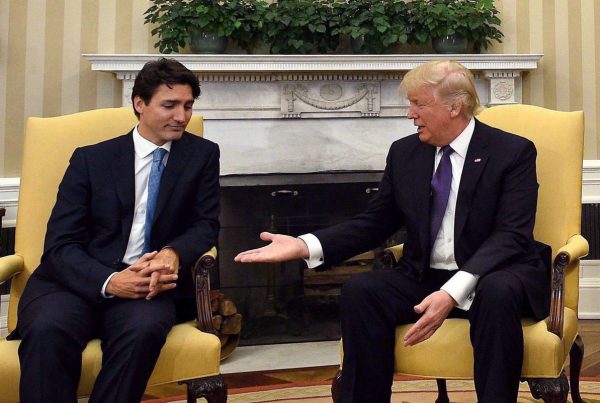In my 14th April column for the Globe’s ROB I lovingly debunk the notion put about by Ottawa and the provinces that the latter have somehow torn down the barriers to trade within Canada that they themselves have created. The unedited text I sent to the Globe read as follows:
2017 is a big year for Canada. The country was founded 150 years ago in an act of supreme statesmanship. It is the 100th anniversary of the battle of Vimy Ridge, where we came of age in a sustained act of courage, heroism and determination. Governments in Canada are now claiming that their recently announced Canada Free Trade Agreement (CFTA) deserves to keep such exalted company and will come into force on July 1st, Canada’s 150th birthday.
Does the CFTA deserve such hoopla? On the contrary. While it represents some modest incremental progress on creating a national market open to all Canadians on equal terms, this progress has much to be modest about. Moreover the sordid backroom horse-trading that gave rise to it, in which rent-seeking interests allied to various governments saw many of their unfair advantages maintained, was the very opposite of what the founders of Canada thought they were conferring on their posterity.
Yes, it’s very nice that every field of economic activity is now covered by CFTA, as opposed to the old dispensation where only those fields specifically included were covered. But the price the provinces exacted for this was well over 100 pages of exemptions and exceptions to the principle of free trade within Canada.
The really tough areas, such as liquor, financial services and regulatory harmonisation? Well they have promised to study those some more. Don’t try and sell milk or eggs or any other “supply-managed” product across provincial boundaries. The barriers that forced Newfoundland and Labrador to sell their electricity to Quebec at a fraction of its value remain and nowhere I can find do the premiers promise to give up their latest fad: claiming the right to veto pipelines that cross their territory. Alberta is already considering creating a Crown corporation to handle government construction projects to escape the opening of government procurement they just agreed to.
Finally, on actually enforcing the rules of free trade our political leaders raised the monetary penalties for non-compliance. Again, very nice. But they’re hoping you won’t notice they have essentially maintained their Rube Goldberg mechanism in which the complaints of businesses and individuals about unfair actions or practices will be the subject of endless intergovernmental consultations and panels whose decisions will come long after the original business opportunity has died from neglect, starvation and exposure. God help you if you want to get the courts to intervene to make governments follow their own rules, because the governments have made it clear they don’t want those bolshie judges sticking their nose in the provinces’ business.
It didn’t have to be this way.
The very purpose of Confederation, we often forget, was in large part about freeing Canadians to carry on their profession or business across provincial boundaries. As George Brown famously described the vision its authors had of Confederation: “the proposal now before us is to throw down all barriers between the provinces — to make a citizen of one, citizen of the whole.” Such freedom was explicitly to be a matter of shared national citizenship.
Responsibility for achieving Brown’s vision was granted to the national government in a broader federalist arrangement. The essence of federalism is, after all, the creation of a unified national economic space while buttressing local identities, be they linguistic, cultural, ethnic or religious.
Matters of nation-building or common interest – such as the functioning of the national economy – were thus to be entrusted to the newly-created national government rather than provincial or parochial interests. That’s why it got jurisdiction over peace, order and good government, trade and commerce and national infrastructure. That’s why there is a national open market clause (Section 121).
But that’s not what happened with the CFTA. There the federal government continued the appalling tradition of its predecessors in neutering federal power in order to appease the provinces and territories. The result is not only another bad deal for Canadian businesses, workers, and consumers, it’s a disavowal of Confederation itself.
The founders gave Ottawa responsibility for the national economy because they expected provincial governments to speak for provincial interests. That’s precisely what happened. Someone needed to speak for Canada. Instead the silence was deafening.
The sheer number of CFTA exceptions is a by-product of how ill-suited the provinces and territories are to protect and strengthen the economic union. Provincial and territorial ministers naturally care more about the interests of Ontario wineries, Quebec funeral directors, Nova Scotia fur harvesters and PEI architects than about the national interest.
The CFTA is not evidence, as its authors claimed, that “Canada works.” On the contrary, it is eloquent evidence of Ottawa’s unwillingness to face down the provinces when the national interest requires it. Ottawa exists for a reason; that reason is not, as one former prime minister tartly observed, to be headwaiter to the provinces.
Brian Lee Crowley (twitter.com/brianleecrowley) is the Managing Director of the Macdonald-Laurier Institute, an independent non-partisan public policy think tank in Ottawa: www.macdonaldlaurier.ca.


